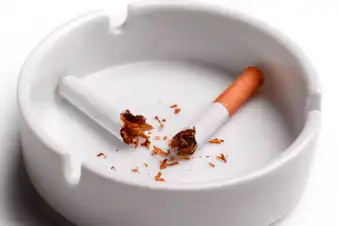Tips to Help Minimize Vasomotor Symptoms

Quit Smoking
Research suggests smoking makes vasomotor symptoms worse, especially if you’re overweight. If you smoke cigarettes or use tobacco products, now’s the time to quit. Studies suggest that quitting before age 40 lowers your odds of getting hot flashes and night sweats. Quitting is also good for your heart. This is extra important at menopause, when your risk of heart complications goes up.

Dress in Layers
Heat can trigger hot flashes. When you get dressed in the morning, think ahead about possible changes in temperature. Will you be outdoors in warm weather, indoors without air conditioning, or overheated from working out? Layers give you options: As the temperature heats up, you can simply peel off a layer or two -- or put it back on if you feel cool again.

Create a Cool Bedroom
Staying cool can ward off night sweats. Before you go to bed, lower the temperature in your bedroom. Put a fan in the room and turn it on before you fall asleep. If it’s cool outside, open a window. Cotton sheets and clothing let your skin breathe, which may keep your body cooler. Keep an ice pack or a glass of ice water on your nightstand so you can reach over and cool off in the middle of a night sweat.

Maintain a Healthy Weight
Being overweight or obese can make hot flashes worse. If you’re at a healthy weight, you may have fewer and less intense hot flashes. You can ease symptoms by losing a few pounds. Try to follow a healthy diet and make exercise a regular part of your day. If you’re new to exercise, try simple changes like taking the stairs instead of the elevator.

Eat the Right Foods
The right diet may help with hot flashes. Try to eat small, light meals. Avoid spicy foods, which may trigger symptoms. Certain foods have plant estrogens that may offset hormonal changes. The research isn’t clear on whether they help with vasomotor symptoms, but they’re generally safe in your diet. These foods include:
• Beans
• Chickpeas
• Flaxseed
• Fruit
• Grains
• Lentils
• Soybeans
• Vegetables

Get Moving
It may seem like sitting still is the best way to stay cool, but regular workouts may actually help ease your vasomotor symptoms. Research shows those who aren’t active seem to have more hot flashes. Exercise also helps you maintain a healthy weight, which is linked to fewer and less intense vasomotor symptoms. When you work out, watch the temperature so you don’t overheat. Dress in layers and work out in a space that’s nice and cool.

Know Your Triggers
You may be able to stop hot flashes and night sweats before they start by avoiding common triggers that set them off, such as:
• Alcohol
• Caffeine
• Coffee, tea, and other hot beverages
• Heat
• Hot weather
• Spicy foods
• Stress
• Tight clothing
Everyone’s different, so it helps to track your symptoms with a diary or journal. This can help you pinpoint what triggers your symptoms, and you can steer clear of them when possible.

Talk to Your Doctor
You don’t have to just suffer through hot flashes and night sweats. Talk to your doctor about treatments to lessen these symptoms. They may recommend prescription medication or over-the-counter remedies. Hormone replacement therapy and other drugs dial back how often and how bad your hot flashes are. Non-hormonal treatments like Fezolinetant (Veozah) can also help with hot flashes or night sweats. Complementary treatments like meditation, deep breathing, and acupuncture may also help you manage with hot flashes and night sweats.
Show Sources
IMAGES PROVIDED BY:
1) The Image Bank / Getty Images
2) MixMedia / Getty Images
3) Valentina Cassiani / EyeEm / Getty Images
4) Maskot / Getty Images
5) istetiana / Getty Images
6) Thomas Barwick / Getty Images
7) Mayur Kakade / Getty Images
8) FatCamera / Getty Images
SOURCES:
International Journal of Epidemiology: “Smoking, body mass index, and risk of vasomotor symptoms: a pooled analysis of eight studies.”
Breastcancer.org: “Exercise and Nutrition to Ease Hot Flashes.”
Cleveland Clinic: “Hot Flashes.”
Johns Hopkins Medicine: “Introduction to Menopause.”
Mayo Clinic: “Hot Flashes,” “Weight gain in women at midlife: Unique issues in management and the role of menopausal hormone therapy.”
National Institute on Aging: “Hot Flashes: What Can I Do?”